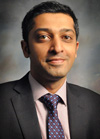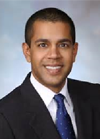Interview with Top Supreme Court Lawyer
January 16, 2015 - Tamara Williams
This Fall, members of the New Mexico Law Review and Professor Dawinder “Dave” S. Sidhu met distinguished visitor Kannon Shanmugam -- a leading Supreme Court advocate, partner at Williams & Connolly, and former Assistant to the Solicitor General of the United States. After meeting with the students, Mr. Shanmugam sat down to chat with Professor Sidhu.

Professor Dave Sidhu

Kannon Shanmugam
DAVE SIDHU: You may be best known for your Supreme Court litigation, but I’d like to begin by talking about your outstanding community work. You serve as the Chair of the Board of Trustees of Thurgood Marshall Academy, a public charter school located in Anacostia, Washington, DC. Could you please describe how you came to be involved with the Academy, and address the responsibility that you believe lawyers have to their communities?
KANNON SHANMUGAM: I’ve been involved with the Anacostia community since I first came to Washington. I was an associate at Kirkland & Ellis working with Ken Starr, who taught for many years at Anacostia High School, and he was kind enough to take me along with him. Later, when I left government service, I was looking for another opportunity to become involved in Anacostia, and my firm, Williams & Connolly, has a longstanding relationship with Thurgood Marshall Academy.
Thurgood Marshall Academy is a perfect fit. It is dedicated to law and public service. A substantial part of its curriculum focuses on the study of law. And, of course, the school is named after one of the great and historic legal figures of the twentieth century. It’s personally rewarding to see the students thrive with the exceptional education that they are receiving.
It’s important for all lawyers to give back to their community, and to do so in ways outside of their formal legal practice.
SIDHU: You mentioned Judge Starr. My understanding is that, as Solicitor General, he instituted a practice whereby all lawyers in the office were required to do two moot arguments prior to any actual oral argument before the Supreme Court. Do you continue this practice as a private attorney?
SHANMUGAM: Absolutely. I do it for all of my arguments. I think it’s the most important part of preparing for oral argument. Supreme Court advocacy is all about handling questions, and there is no better way to prepare for argument than actually answering questions. Sometimes I get more nervous before a moot than before an actual Supreme Court argument, because the whole point of a moot is to have your friends and colleagues be as hard on you as possible.
SIDHU: To build confidence, do you moot against Thurgood Marshall students?
SHANMUGAM: I haven’t yet enlisted Thurgood Marshall students to be mooters. Maybe one of these days I will, though I suspect they would be pretty hard on me too!
SIDHU: I have heard Supreme Court oral arguments being analogized to the last stage of marathon, where the lower court opinions and briefs constitute the bulk of the race. To what extent do you believe that oral argument, at that last stage, can have a meaningful impact?
SHANMUGAM: Every advocate would like to believe that he or she can change the Justices’ minds at oral argument. But it’s probably rare that the oral argument actually affects the bottom-line outcome. In truth, I suspect the briefing is usually more important than oral argument.
SIDHU: You clerked for Judge J. Michael Luttig and for Justice Antonin Scalia. How helpful do you believe your clerkships were to the development and refinement of your research, writing, and analytical skills?
SHANMUGAM: Clerking on any level is invaluable, whether it’s on the Supreme Court of the United States or on a municipal court. That’s because it’s the one chance that most lawyers have in their careers to see things from the other side of the bench and to witness the decision-making process. As a law clerk, you also get to see lawyers in action and to get a sense of what lawyers should and should not do. That is tremendously educational as well.
SIDHU: You have argued an impressive 16 times before the Supreme Court of the United States. Is there anything you wish you know now about arguing before the Court that you wish you knew as a rookie?
SHANMUGAM: How much time do you have? [Laughter] There is no substitute for experience. As with many other things in life, you learn by doing. I can’t begin to list the number of things I wish I knew then that I know now.
I started my career in the Solicitor General’s office. I was fortunate to be surrounded by some of the best and most experienced Supreme Court advocates around. There was no better way to learn about the craft of Supreme Court advocacy than to have people like that as your mentors and peers. To the extent that I have learned, it’s not only by doing all of those arguments, but by learning from such great colleagues.
SIDHU: Amicus briefs seem to have a mixed reputation. What are your thoughts on their value?
SHANMUGAM: Amicus briefs are important and are becoming increasingly important even in lower courts. They are a way to bring distinctive perspectives to the court’s attention and to inform the court of the broader implications of the issues that the court is being asked to decide. They can make valuable contributions by making additional arguments, or by making arguments in different ways than the parties do.
SIDHU: How would you describe your style as an oral advocate?
SHANMUGAM: I always try to remember that my role in the process is as an officer of the court—to help the court reach a decision in my client’s favor. The most important thing is to answer the court’s questions to the best of my ability, and to answer them in a way that persuades the court that our position is the better one. The best advocates are the ones who are able candidly to answer the court’s questions and to respond to its concerns, yet to get the court to move in their direction.
SIDHU: Is there anyone that you model your oral advocacy after?
SHANMUGAM: It’s hard to go beyond Michael Dreeben and Edwin Kneedler, the two longest-serving attorneys in the Solicitor General’s office.
SIDHU: One of my beloved colleagues, Fred Hart, is a die-hard San Francisco Giants fan. Recently, the Giants beat your Kansas City Royals in the World Series. I am asking this question on his behalf: for how long, and in what position, did you cry following the Royals’ loss?
SHANMUGAM: [Laughter] Hats off to the Giants. I didn’t cry when the Royals were eliminated—it was a terrific run and really exciting for those of us from the Kansas City area. I went to Game 6, which turned out to be far better than Game 7. I have to admit that I did shed a few tears when the Royals made the playoffs for the first time in 29 years, but those were tears of joy, not sorrow. Hopefully it won’t be another 29 years before we’re back.
SIDHU: Thank you for generously spending time with some of our students and with me.
SHANMUGAM: My pleasure.
